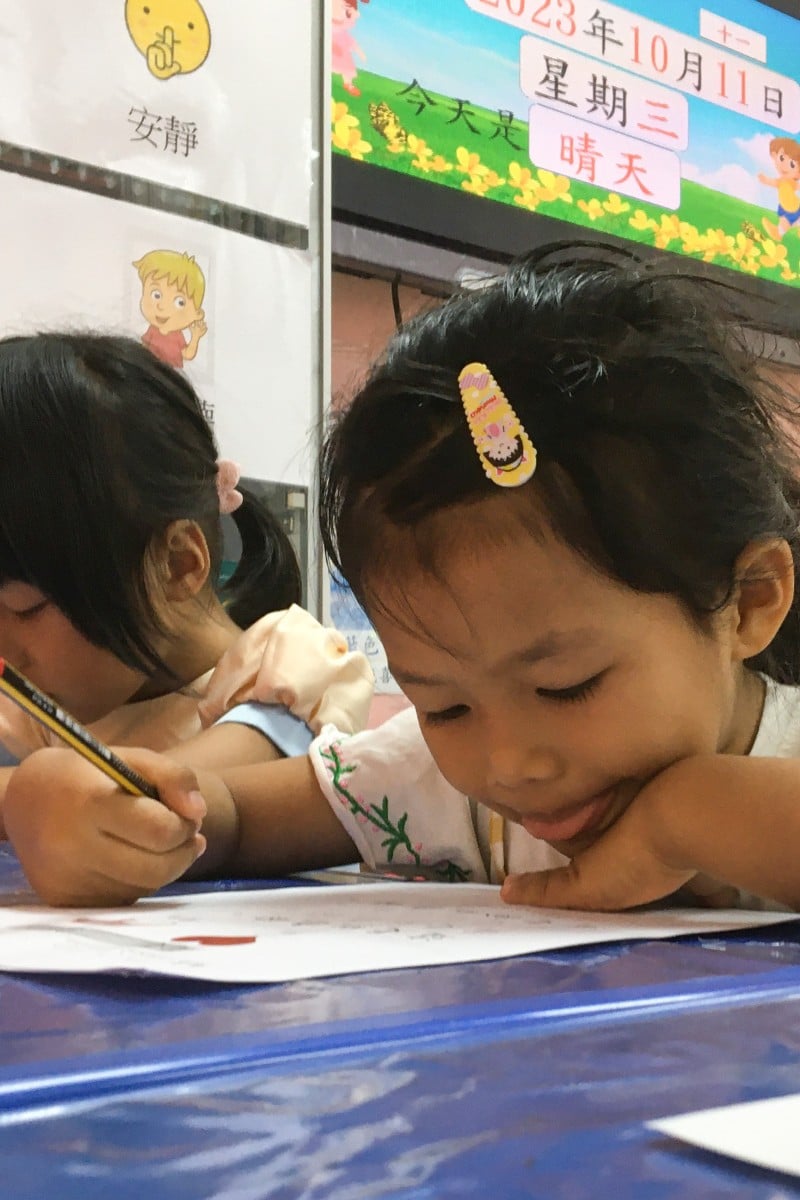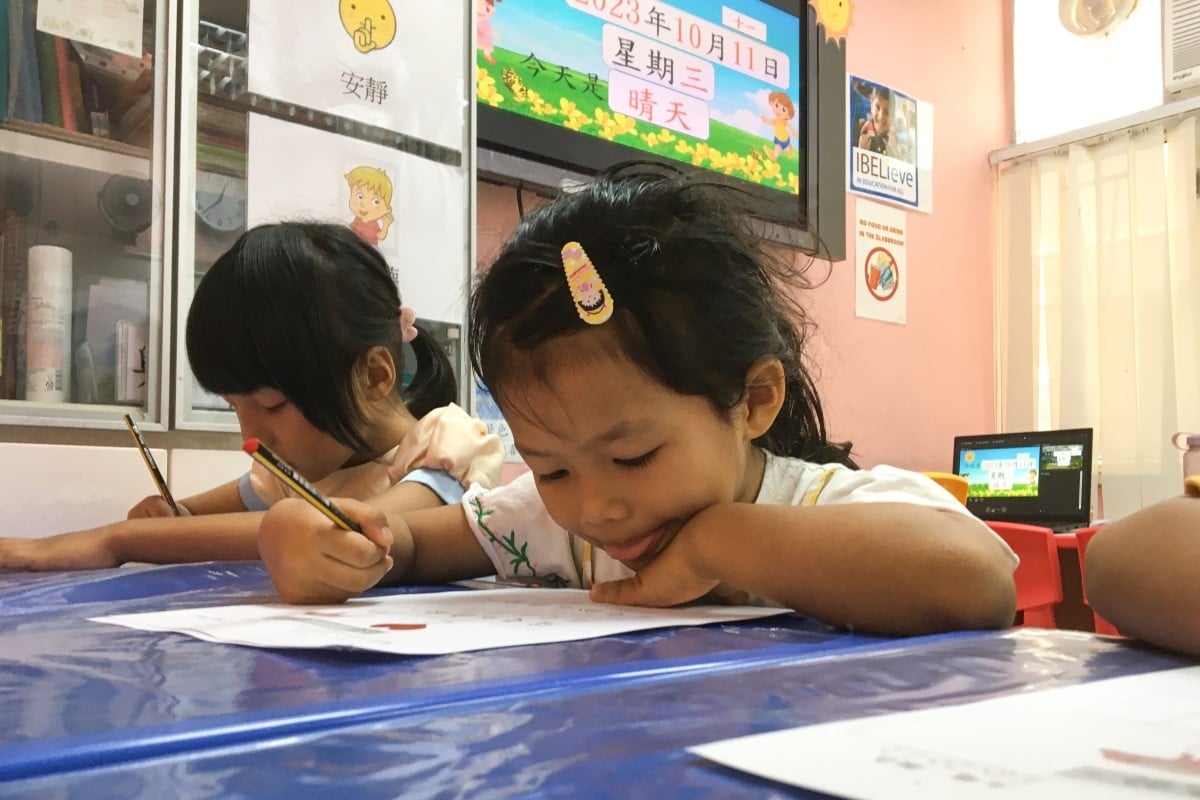
- It is crucial to help marginalised ethnic minority residents assimilate and excel in the city, IBEL charity founder Manoj Dhar says
- Integrated Brilliant Education Limited received donations through Operation Santa Claus from Morgan Stanley to set up a kindergarten
 IBEL-run centres offer affordable Chinese-language tuition to underprivileged ethnic minority children. Photo: Cindy Sui
IBEL-run centres offer affordable Chinese-language tuition to underprivileged ethnic minority children. Photo: Cindy Sui“Good morning, Ms Una,” a five-year-old Nepali girl proudly told her teacher in Cantonese after she carefully traced Chinese characters at a tutorial centre in Hong Kong.
Yasmina Kapali barely knew any Chinese before she came to the charity centre run by Integrated Brilliant Education Limited (IBEL) in Jordan.
“I only talked a little bit of Chinese,” said the pupil. “It’s too hard.”
IBEL, founded by long-time city resident Manoj Dhar and his wife in 2015, offers subsidised Chinese-language tuition to 280 underprivileged ethnic minority children at that facility, as well as another one in Sham Shui Po. These youngsters, whose parents do not speak Chinese, face difficulties in becoming fluent in Hong Kong’s education system.
Dhar, an Indian former bank manager and IBEL’s CEO, said he and his wife decided to step in after they realised that children of blue-collar South Asian parents were falling behind academically and graduating from schools without achieving the Chinese fluency necessary to get well-paid jobs.
They were “struggling with Chinese-language learning and that caused them to continue to struggle with being in the underprivileged segment of the community, continue to be part of the blue-collar workforce, and never be able to pull themselves out of that blue-collar track”, Dhar said.
After the 1997 British handover of Hong Kong to China, most public schools changed their main medium of instruction from English to Chinese.
As a result, many ethnic minority pupils could not keep up and were turned away by schools that saw them as a burden, according to Dhar.
They ended up attending schools with a disproportionately high number of non-Chinese-speaking students, which Dhar said left them short of the benefit of interacting with their Chinese peers.
Pouring more government funding into schools to improve the children’s Chinese-speaking ability did not help, according to Dhar, adding the number of ethnic minority students able to take the university entrance exams in Chinese had dropped in the city.
Section Juan gives Filipino-Hongkonger youth space to explore cultural identity, mental health
“The common narrative is it’s never the education institution’s problem, it’s always the child’s problem,” he said, adding it was time to take a different approach.
His facilities have received charitable donations from US investment giant Morgan Stanley through the Operation Santa Claus (OSC) fundraising campaign to build a kindergarten in Tsim Sha Tsui to immerse children in a Cantonese-learning environment at a young age.
While prioritising underserved ethnic minority children, the kindergarten will also welcome Chinese pupils, so they can learn from each other and learn together.
“When at kindergarten they do not pick [Chinese] up … it gets harder and harder and they can never compete on an equal basis because the system is not inclusive and the child is not given equal opportunity,” Dhar said.
He said he hoped he could get the kindergarten opened by March next year after obtaining all the necessary licences.
The kindergarten will follow IBEL’s long-time approach of nurturing the academic, physical and mental well-being of the children and helping them integrate socially and culturally through classroom sessions as well as sports and other activities, according to Dhar.
He expressed confidence that Chinese parents would enrol their children in the kindergarten because it would provide high-standard Chinese and English instruction.
Dhar said it was crucial to help the marginalised ethnic minority “daughters and sons of Hong Kong” assimilate and excel.
“If the children are not being educated, or are not skilled enough, there’s going to be intergenerational poverty,” Dhar said. “It’s a very simple question: do you want them to be income-tax payers or social welfare beneficiaries?”
As Yasmina was preparing to leave, her mother Suman Pun arrived to pick her up.
Pun does not speak Chinese and said her husband, a construction worker, only spoke enough to communicate with his colleagues.
Hong Kong’s ethnic minority students face uphill battle in mastering Chinese
“It’s very important for her [Yasmina] to learn Chinese. … If she knows Chinese, it’s easier to live here, speak to people and find jobs,” she said.
Being fluent in Chinese can also help Yasmina achieve her dream of becoming a teacher when she grows up.
OSC is an annual fundraising initiative that has been held by the South China Morning Post and public broadcaster RTHK since 1988.
So far, it has raised HK$369 million to support the Hong Kong community through 338 charitable projects.
There are 15 charitable projects of worthy causes being funded this year and IBEL is one of them.
For more information on this year’s beneficiaries, please click here.